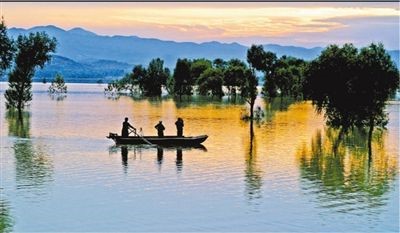

Many descendants of the people who were relocated as a result of the construction of the Danjiangkou reservoir are devoting themselves to ecological conservation in a wetland national nature reserve in their hometown.

Workers patrol the Danjiang Wetland National Nature Reserve. (Photo courtesy of the Danjiang Wetland National Nature Reserve)
The reservoir is the water source of the central route of China's south-to-north water diversion project, and is included in the Danjiang Wetland National Nature Reserve located in Xichuan county, central China's Henan province.
Forest ranger Ma Wei is one of them. His hometown is Taohe township in the county, where his grandfather worked on the construction of the reservoir. In 2009, his family was resettled in the province's Luohe city.
Eight years later, the then 26-year-old Ma chose to work at the management office of the nature reserve, becoming the youngest staff member there.
Ma and his colleagues face the daunting task of carrying out regular patrols of the reserve, which covers an area of over 64,000 hectares. During patrols in summer, they face getting stung by scoliid wasps as their nests are usually difficult to see.
As there are still over 90,000 residents in the reserve, Ma often explains to them the importance of water ecology protection by telling stories of their ancestors. "Protecting the local ecological environment and the reservoir also brings benefits to us," Ma said, adding that more and more young people have joined them in their efforts.
35-year-old Chai Erhu is a member of the law enforcement team that protects the reserve's water surface area of more than 33,000 hectares. He served as a submariner for five years, and joined the team 12 years ago after retiring from the army.
Local authorities have implemented extremely rigorous environmental measures to ensure water quality for the south-to-north water diversion project, including bans on aquaculture and floating restaurants.
In the past, waste water and rubbish were directly discharged into waterways by several floating restaurants. Together with officials from the local fishery department, public security and governments, the team has used all means at their disposal to ban these restaurants.
"A 20-meter-long small boat with dining tables could earn about 10,000 yuan per day," Chai said, adding that banning them initially proved to be a very difficult task.
While imposing tough punishments, the law enforcement team tried to persuade the restaurant owners to be proactive. Subsidies were offered to owners of large boats, and administrative orders were issued to let owners of small boats change their jobs. After two years of efforts, all floating restaurants were removed.
Another example is Jia Guoheng, who is responsible for collecting floating objects in the water.
During the flood season or water-retention period, numerous floating objects appear, which will affect water quality and must be handled promptly, according to Jia, adding that he and his colleagues contribute to some degree to keeping the reservoir water clear.
Jia said he had to salvage floating objects from the water hundreds of times a day. "Sometimes I feel bored, but I was filled with a sense of accomplishment at the sight of the clearer water," he added.
Thanks to their efforts, the water in the reservoir now meets Grade II standards or above all year round.
 Fire brigade in Shanghai holds group wedding
Fire brigade in Shanghai holds group wedding Tourists enjoy ice sculptures in Datan Town, north China
Tourists enjoy ice sculptures in Datan Town, north China Sunset scenery of Dayan Pagoda in Xi'an
Sunset scenery of Dayan Pagoda in Xi'an Tourists have fun at scenic spot in Nanlong Town, NW China
Tourists have fun at scenic spot in Nanlong Town, NW China Harbin attracts tourists by making best use of ice in winter
Harbin attracts tourists by making best use of ice in winter In pics: FIS Alpine Ski Women's World Cup Slalom
In pics: FIS Alpine Ski Women's World Cup Slalom Black-necked cranes rest at reservoir in Lhunzhub County, Lhasa
Black-necked cranes rest at reservoir in Lhunzhub County, Lhasa China's FAST telescope will be available to foreign scientists in April
China's FAST telescope will be available to foreign scientists in April "She power" plays indispensable role in poverty alleviation
"She power" plays indispensable role in poverty alleviation Top 10 world news events of People's Daily in 2020
Top 10 world news events of People's Daily in 2020 Top 10 China news events of People's Daily in 2020
Top 10 China news events of People's Daily in 2020 Top 10 media buzzwords of 2020
Top 10 media buzzwords of 2020 Year-ender:10 major tourism stories of 2020
Year-ender:10 major tourism stories of 2020 No interference in Venezuelan issues
No interference in Venezuelan issues
 Biz prepares for trade spat
Biz prepares for trade spat
 Broadcasting Continent
Broadcasting Continent Australia wins Chinese CEOs as US loses
Australia wins Chinese CEOs as US loses